As soon as the word “formula” rolls off your tongue and leaves your mouth for everyone to hear, uncomfortable silence occurs. Parents are reluctant to talk about or admit freely they feed their babies infant formula. Most are suffering from the deeply entrenched shame and judgment that is associated with formula feeding; they have experienced it first hand in countless social media parenting groups, from friends, their health care professionals, WIC offices, and even in their hospitals.
How did we get to the place where talking about infant formula is profoundly divisive, shameful, and anxiety provoking for parents?
Let’s face it, infant FORMULA is the new seven letter F word. The scarlet letter F. FAILURE.
I frequently receive questions from anxious parents who want to know if everything they have been told about formula feeding is true. They often convey feelings of failing their baby and question their worth as a parent who could not provide exclusive human milk. The emotional suffering they carry is the foremost reason why I wanted to write about the topic of infant formula shaming.
Is the current breastfeeding advocacy responsible?
One of the problems of our current breastfeeding promotion is it has characterized infant formula as a substandard or dangerous form of nutrition, by providing false and misleading claims. The Just One Bottle campaign was intended to persuade parents to avoid formula citing risks of formula that are mostly speculative. But the message of this campaign continues to be taught to parents daily. Promoting false and confusing medical information is grossly unprofessional, unethical, and reckless, as this false information has put infants’ and mothers’ lives at risk.
Avery’s life was one of them. She writes: I had more than enough support for breastfeeding, but very little support for switching to formula when I knew it was best for my own mental health, and for my son. I can’t fathom telling a mom she’d better breastfeed or might as well be dead. But I was told this—and I believed them. I remember being in the basement bathroom and looking up at the tiny window and thinking that would be the last thing I saw before I died. I was ready to go.
Let’s take a look at an example of exaggerated and false formula feeding information:
After reading this pamphlet from WIC, I can understand why parents are panicking. The formula risk brochure is grossly inaccurate and false and specifically says:
40–50% will develop asthma
Greater chance of dying from SIDS
40% are likely to be obese
More likely to get leukemia and other cancers
Higher risk of dying from diarrhea and lung infections
This educational pamphlet is one example of what parents receive about formula feeding risks from WIC, in California. Up to 50 percent of US families receive nutritional benefits for their babies from WIC and will receive similar education.
This is an example of how formula is described as junk food by a lactation consultant
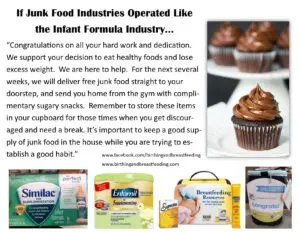
Sara writes : The main reason I used formula was that I didn’t make enough breast milk, and my daughter was starving. They always leave that one off when they lie to women about how “everyone can breastfeed.” When people say fed is minimum or formula is junk food, they make me feel ashamed that I have a medical condition, which is so messed up. If I had continued to exclusively breastfeed, my daughter would be dead. Formula saved her life. But any time I bring this up, I get told I didn’t try hard enough, or I didn’t actually have a low supply. It’s ableist and abusive.
Human milk is depicted as magical
Social media has elevated the status of human milk from desirable nutrition for babies into pure magic! Human milk can cure everything they say. A Google search yields countless treatments using human milk to cure eye infections, stretch marks, ear infections, diaper rash, cancer, and even COVID. But it can’t and doesn’t.
Human milk doesn’t have to be a magical elixir to be valuable. Do you know what is magical? Inclusive infant feeding support free of shame and judgment. And oh, a 6 month paid maternity leave.
However, shaming infant formula is oh so easy. Shaming infant formula is the easy way out. It’s cruel to shame infant formula when parents are unable to push through the barriers that exist. The decision between breastfeeding and formula feeding is increasingly complicated by the barriers that exist in the United States. In fact, many times a mother doesn’t have a choice whether she can exclusively breastfeed for 6 months. We need to remove the many barriers FIRST before breastfeeding promotion saddles parents with the burden of exclusive breastfeeding, while receiving abysmal support. But formula shaming is so much easier.
This is an example of what formula shaming does.
Laura writes: At first, I felt like a total failure and could not understand why my breasts would not do what they were supposed to. I would sob as I fed her formula. But over time I saw how much she was thriving and I started to forgive myself. I truly believe supplementing and then exclusively formula feeding saved me from hurting myself and allowed me finally to love my baby.
In the US alone, 75% of babies will receive infant formula before the first 6 months of life. Parents who are formula feeding require education about how to safely prepare and feed their babies formula, during a period of time when their brain and body are rapidly growing, when formula is their sole source of nutrition. Formula feeding parents deserve to be treated with respect and without any kind of shame or judgment.
Did you know there are no unbiased educational resources for formula feeding parents readily available like there are for breast/chestfeeding parents? Not. one. Parents are forced to figure out how to formula feed their babies all on their own, searching the web for self-proclaimed formula experts, or using formula industry–created resources.
The demonizing of the F word has now driven formula feeding parents who are seeking support and education straight into the arms of Big Formula!
Just this week, a study tells us that “It is important to understand the messages caregivers are receiving directly from formula companies, whose websites are targeting pregnant women and new parents with marketing claims disguised as feeding advice and support.”
The study, led by researchers at the NYU School of Global Public Health and published in the journal Public Health Nutrition, is the first to compare information and portrayals of breastfeeding with infant formula feeding on manufacturer websites directed at U.S. consumers.
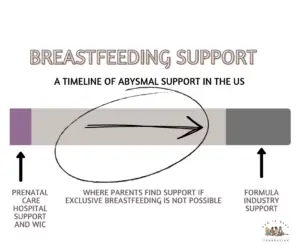
This leaves a significant number of parents who are being supported only by formula companies. This is a problem, not only for exclusively formula feeding families, but also for those who want to keep breastfeeding while also adding some formula into their routine. While parents have access to the experience and insight of their pediatricians, well-baby check ups are relatively brief and infrequent. Facing a whole grocery store aisle filled with different brands and types of formula, and unstandardized prices per ounce, parents often feel paralyzed and helpless. Formula companies thrive on this confusion, because it enables them to sway parents towards their brand and charge more money for attributes that have not been proven to be necessary for infant health. This is especially problematic for WIC recipients. Since WIC typically provides only one brand of formula in quantities that are not enough to fully meet infants’ needs, parents are often under the impression that they must buy more of the same brand, instead of the equally nutritious generic equivalent.
Parents often ask me why infant formula is despised by breastfeeding zealots and I wish I had an answer for them. Is it because they hate Nestlé and formula company marketing tactics? I get it. I do. I have no love for Big Formula and their ruthless tactics to sell their product. The difference between me and them is that I don’t hate their product and would never, ever call it substandard nutrition—because it isn’t.
We can easily support breastfeeding while supporting formula feeding parents. I have done this every day of my professional life for the past 30 years.
Silence and shame have no place in health care, and I encourage all health care professionals to talk about infant formula, so that parents can trust you with their questions to keep their babies safe. Otherwise, they will resort to finding answers to their questions by unqualified people or those with a profit motive. I encourage parents to talk about formula too, because there is nothing shameful about feeding your babies with a safe, healthy, scientifically formulated milk.
Stay tuned as I begin my blogging series about safe infant formula feeding in an unbiased manner. I will be interviewing pediatricians, neonatologists, and food scientists to talk about infant formula, and giving you accurate information straight from the experts.
Jody Segrave-Daly, MS, RN, IBCLC
If you need infant feeding support, please join us here.
An Evaluation Of The Real Benefits And Risks Of Exclusive Breastfeeding.
Breastfeeding Benefits: The Real, the Imagined, and the Exaggerated
The Shaming Began In My Hospital Breastfeeding Course And Never Stopped
Can Stem Cells From Breast Milk Be Found In The Brain Of Babies?
I Was Having Suicidal Thoughts Because I Was Shamed For Not Making Enough Breast Milk For My Baby
Dear Chrissy Teigen, You Are Right; We Need To Destigmatize Formula Feeding Our Babies
What Happens When Mothers Are Told Being Fed Is The Bare Minimum?
http://fedisbest.org/2017/05/i-no-longer-judge-other-mothers-my-breastfeeding-challenges-have-absolutely-changed-me-as-a-mom-a-woman-and-a-friend/
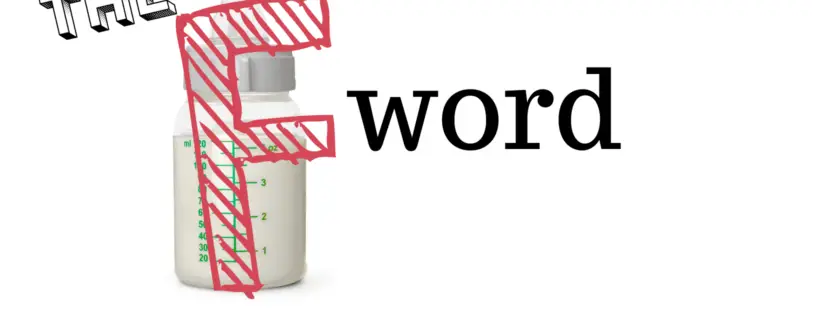
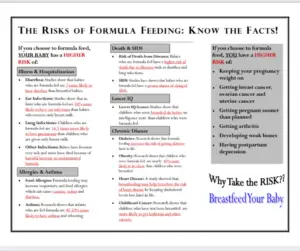
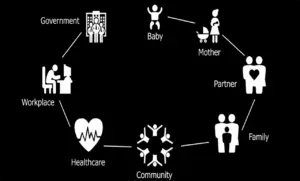
One thought on “The New Seven Letter “F” Word”